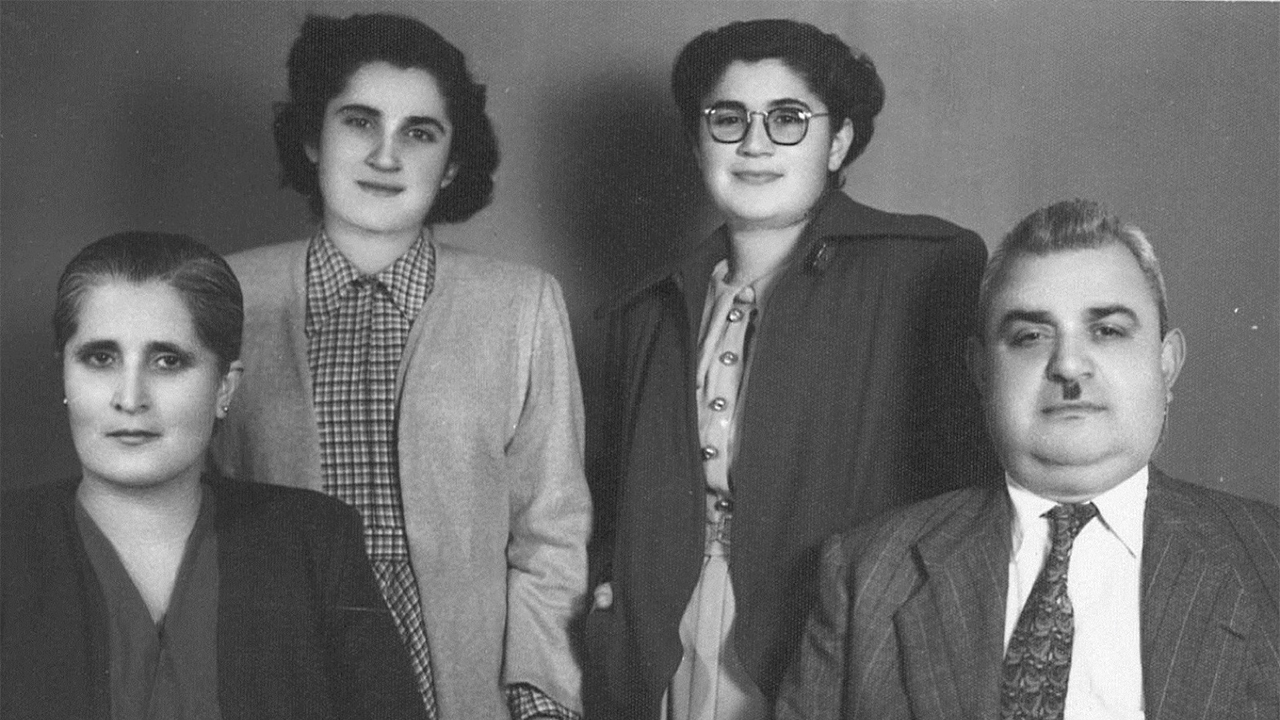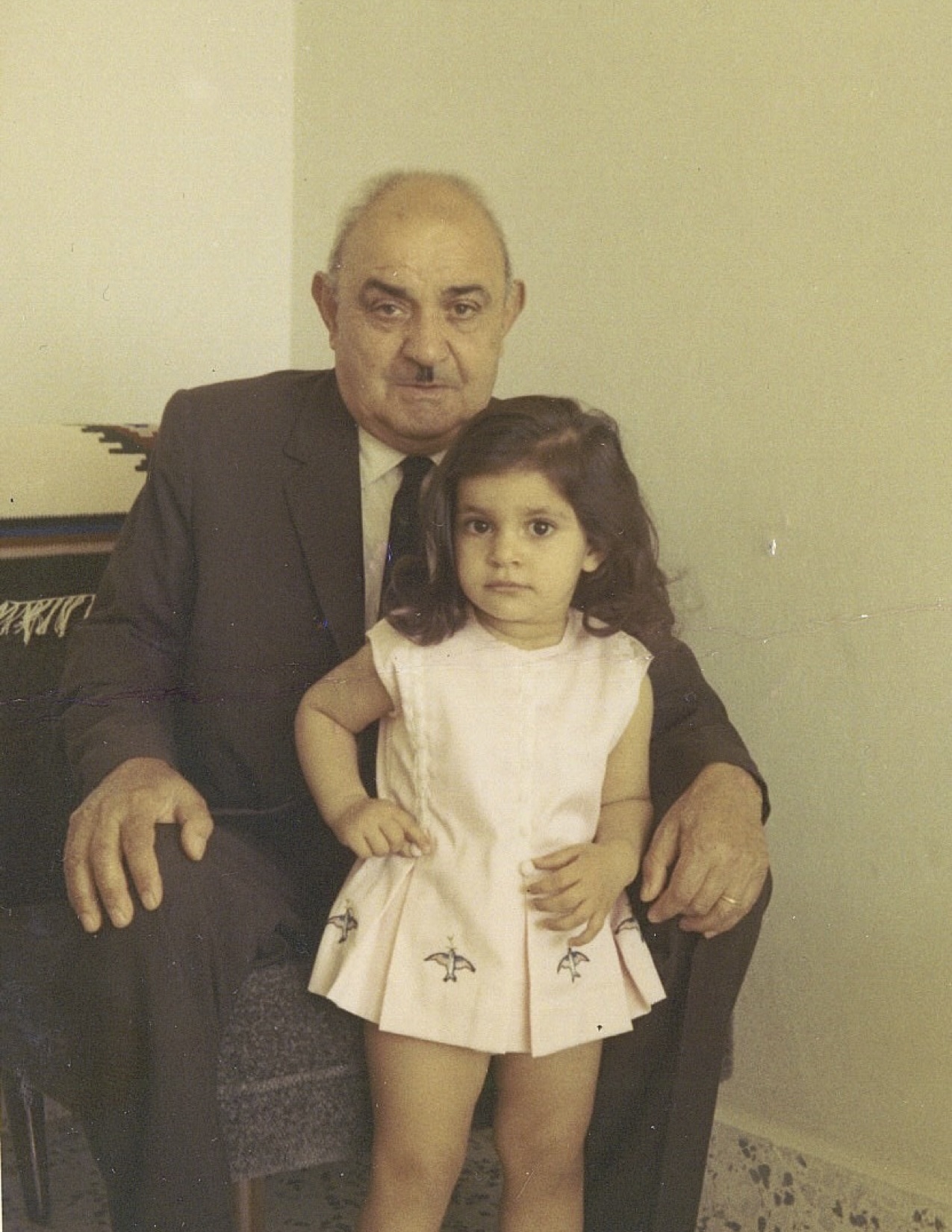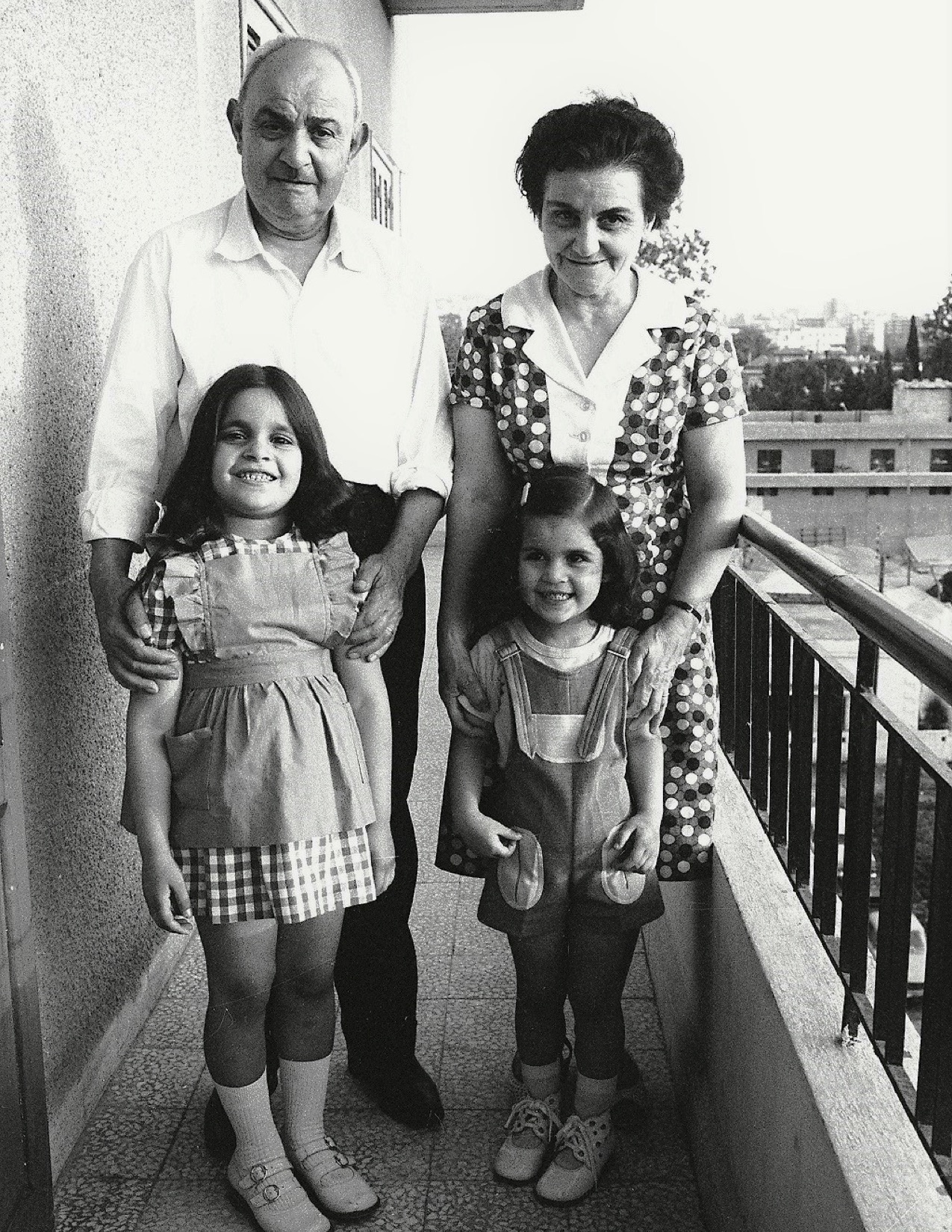
(Back Row: L-R): Jeanette (our mother) and Betty (our aunt, wearing glasses) (Front Row: L-R): Our Grandmother, Gulenia and our Grandfather, Natan
Doris and Arda Melkonian are sisters and students in Fuller’s School of Theology, both working toward a Master of Arts in Theology degree. While pursuing their doctoral degrees at UCLA, Doris and Arda were influenced by Professor Richard Hovannisian and his Armenian genocide Oral History course. Working as Dr. Hovannisian’s teaching assistants, the two sisters delved into the Armenian genocide survivor testimonies, and noticed a glaring void in scholarly work on the intersection of faith and the Armenian genocide. Their desire to fill this gap led them to Fuller Theological Seminary to receive formal theological training to equip them for this unique and important research. Here, Arda and Doris share about their own grandparents’ stories of the genocide, and explore some of the theological questions that have risen in the Armenian community in the aftermath.
As children, we would hear our maternal grandfather, Natan, murmuring “Տէր Ողորմեա” (“Der Voghormia,” Armenian for “Lord have mercy”) as he sat in his recliner in the family room, absorbed in his thoughts. His impenetrable gaze into the far distance signaled to us his inaccessibility, and we quickly learned not to disturb him. At the time, we sensed the seriousness of his gaze, but didn’t comprehend the gravity of his thoughts until we were older.
Our grandfather lived with us in Pasadena, California, for a time after immigrating from Beirut, Lebanon. Now in the twilight of his years, the once robust patriarch shed tears in silence, revealing signs of a traumatic past that he had guarded from his own family. His tears were puzzling to us as there was no apparent cause for them, or so we thought.
Our grandfather’s presence was a blessing in our home, providing the kind of anchor and stability that can only be understood and appreciated by migrant peoples. He was a historical marker, a bridge, connecting us through a series of fragmented narratives to a period in history that was drenched in blood and persecution. Although both sets of our grandparents were survivors of the Armenian genocide, our grandfather Natan became our direct, tangible connection to this painful history.
We do not fully know our grandparents’ narratives since they withheld these harrowing stories to protect their children and grandchildren, but we do know survivors of the Armenian genocide shared a common fate, living through unprecedented horrors and enduring pain that haunted them for a lifetime. The stories of our grandparents’ generation are stories of children who were robbed of a childhood. They are stories of children who were denied the nurturing of their parents and the unconditional love of grandparents. They are stories of children who were snatched from the protective bosom of their communities and thrust into the grip of violence. Their stories convey a new reality of vulnerability and, equally important, they reveal the resourcefulness and perseverance of a people who put their trust in the Lord.

Grandfather Natan with Doris
The Armenian Genocide: An Overview
On April 24, 1915, Armenians living in their ancestral lands, then under Ottoman Turkish rule, woke up to an ordinary spring day. There was nothing special about it—no Armenian holiday, no saint’s day, nor any observances. Armenians throughout the land were engrossed in their daily activities, unaware that their compatriots in Constantinople (now Istanbul) had awakened to a day of terror. This was the day the Turks had chosen to unleash their genocidal plans to obliterate the Armenian people.
As sunlight flooded the land, havoc filled the air, and April 24 ushered in a disruption of epic proportions for the Armenians in Constantinople. The Ottoman Turks arrested several hundred men, pillars of the Armenian community in Constantinople—they were religious and political leaders, intellectuals and artists, and wealthy merchants and businessmen. Without a trial, they were convicted and sentenced to death. Their only crime: being Armenian Christians in a land dominated by Muslim Turks. This day set into motion a sequence of unfathomable events over the next eight years that would eventually spread throughout the land, leaving no Armenian unscathed. Of an estimated two million Armenians, approximately 1.5 million were killed from 1915 to 1923 by the Ottoman Turks.
The news of the arrests and killings evoked panic among the Armenians. Overnight, the Armenian community was decapitated as its leadership lay in graves. Terror permeated as the horrors of evil were unleashed on the vulnerable and unsuspecting. Over several years, as the genocide unfolded, the Turks tortured and killed Armenians, pillaged their homes, confiscated their properties, looted their businesses, and desecrated their churches, turning them into incinerators where they burned clergy alive. Able-bodied Armenian men were either conscripted in the army and subjected to forced labor or arrested and quickly killed. Among these men was our great-grandfather, a devout Christian. Our grandfather Natan recalled how his father was arrested and taken to an open-air prison. While awaiting deportation, Natan would take his father his daily lunch and speak to him through the fence. On one of his visits, Natan was instructed by his father not to visit anymore. The next day, our great-grandfather was taken to the outskirts of the city and killed. Such was the fate of the Armenian men.
And while the men were swiftly killed, the women and children were left vulnerable to the Turks’ atrocities. Many were sent on death marches, forced to endure a prolonged and torturous death from starvation, dehydration, disease, and attacks. Our maternal great-grandmother’s experiences are representative of the assaults endured by the women: She was abducted, then tortured and gang raped for several days before her body was dumped on the doorstep of her home. Her lifeless body lay witness to the horrific acts committed against Armenian women and young girls.
As we reflect on this defining moment in modern Armenian history, for us this is not just a story. It is not an event that we have learned from textbooks. It is a lived history, it is the story of all four of our grandparents (our maternal grandparents, Natan and Gulenia Kouyoumjian; and our paternal grandparents, Mgrdich and Barkevouhi Melkonian) who experienced the horrors of the Armenian genocide and survived. Their stories of survival are the stories of a community who, while they experienced hell on earth, remained faithful to their Lord and maintained their Armenian identity.
April 24, 2020, marks the 105th anniversary of the Armenian genocide. It is not another ordinary day for us Armenians. It is a day shrouded in mourning as we remember not only the loss of life, but also the loss of physical, intellectual, and cultural property, as well as the loss of the tremendous potential of an entire generation. It represents the day that put an end to our “family trees,” replacing them with “family shrubs,” as one of the casualties of genocide is the loss of family histories. It is a marker showing where life on our ancestral lands ended and a new life was forged on foreign soil.

(Back Row: L-R): Natan with his cousin, Sirvart (Front Row: L-R): Doris (standing in front of Natan) and Arda (standing in front of Sirvart)
Asking God “Why?” in the Aftermath of Genocide
Armenians are proud to have been the first nation to accept Christianity as a state religion in AD 301. Therefore, it is difficult for Armenians to comprehend why such horrors would befall us who have chosen Christ. We who have been faithful to God for over 1,600 years, resisting pressures over the centuries to convert to other faiths, from Zoroastrianism in the 5th century to Islam in more recent times. We who have fought countless wars to maintain our faith in God, demonstrating our loyalty to him, have felt a profound sense of abandonment. So we raise our voices to God and cry out, “Why?”
In the Book of Job we encounter the powerful story of a man of God who is subjected to undeserved pain and suffering. A series of tragic events pummels Job and repeatedly tests his faith. Similarly, the faith of Armenians has been tested as they struggle with the undeserved suffering experienced during the genocide and ask: Why did God allow innocent Armenians to suffer? Why was God distant and absent during our persecution? Why did God not punish the evildoers? Why did God not stop the genocide? This refrain, which is often on the lips of the suffering, is a cry of pain to God, beseeching his mercy. Many in the Armenian community, like Job, cry out to God in the hopes of hearing a response from the Almighty. And like Job, they encounter a God who is unresponsive to their pleas.
The character of Job attempts to provide an answer for suffering, but none are satisfactory. Some Armenians find in Job’s narrative an explanation for undeserved suffering. They refer to Job’s example, believing that suffering is caused by our existence in a fallen world where evil reigns and Satan has permission to afflict the righteous.
When there is evil and when we also believe in a God that is involved in history, yet we don’t see the expected action, we are forced to reevaluate our understanding of God. An inner struggle takes root within us as we try to comprehend God’s sovereignty. We have defined God’s abilities, attributing to him divine characteristics—all-knowing, all-powerful, all-good. Some in the Armenian community believe that when we label God in this manner, we might be limiting or hindering our understanding of him. In fact, we might be creating a trap for ourselves, stunting our spiritual growth.
From the gripping story of Job in the Old Testament to Paul’s epistles in the New Testament, we read about suffering. However, while the theme continues to be suffering, the focus shifts from the suffering of the innocent in Job to the persecution of the Christian in Paul’s letters. During the Armenian genocide, the Armenians suffered and were persecuted for their belief in God. Paul refers to the persecution of Christians in 2 Timothy 3:12—“all who want to live a godly life in Christ Jesus will be persecuted”—and this verse has served to comfort Armenians who for centuries have experienced persecution for their faith in Christ.
Drawing from the example of the early Christians, survivors of the genocide explain that Jesus never promised to his followers safety and a comfortable life. Instead, he told them in this world, they would have trials. Jesus said, “If the world hates you, be aware that it hated me before it hated you . . . If they persecuted me, they will persecute you” (John 15:18, 20). This verse had taught Armenians to be prepared to face persecution because of their faith.
As we shift from our conceptual understanding of the suffering of Job in the Old Testament to the very real suffering of the early Christians in the New Testament, we are encouraged to expand our understanding of the role of God as well. While the God of the Old Testament is the God of action, in the New Testament, he is the God who allows his children to suffer for spiritual edification. Some in the Armenian community explain that we cannot expect God to have prevented the genocide.
The suffering of the innocent is a universal topic and one that we broach with great trepidation, for the questions we seek to answer are beyond our human understanding. How can we make sense of the suffering of the innocent in light of God’s grace? And yet, in the midst of our struggles, we cry out in pain to God and seek his presence. We seek him during our crisis, as Job did, and find solace in the assurances of Christ like the persecuted Christians of the early church.
As many Armenian genocide survivors have struggled with the problem of evil, the same perennial question has been on the lips of survivors of various genocides: Where was God during their crisis? Believers and non-believers, survivors and their descendants, have grappled to find a satisfying explanation to this most difficult question. Some have dared to challenge God and question his omnipotence and benevolence, while others have acknowledged God’s sovereign plan.
Survivors of the Armenian genocide have demonstrated a multitude of responses. While some have expressed resentment toward and disappointment with God, others, like our grandparents, express gratitude toward God for his protection and his presence during their trials. While we struggle to find answers to the question of, “Why, O Lord?” may we, like our grandfather, pray for God’s mercy on us all. Տէր Ողորմեա (Der Voghormia—“Lord have mercy”).


